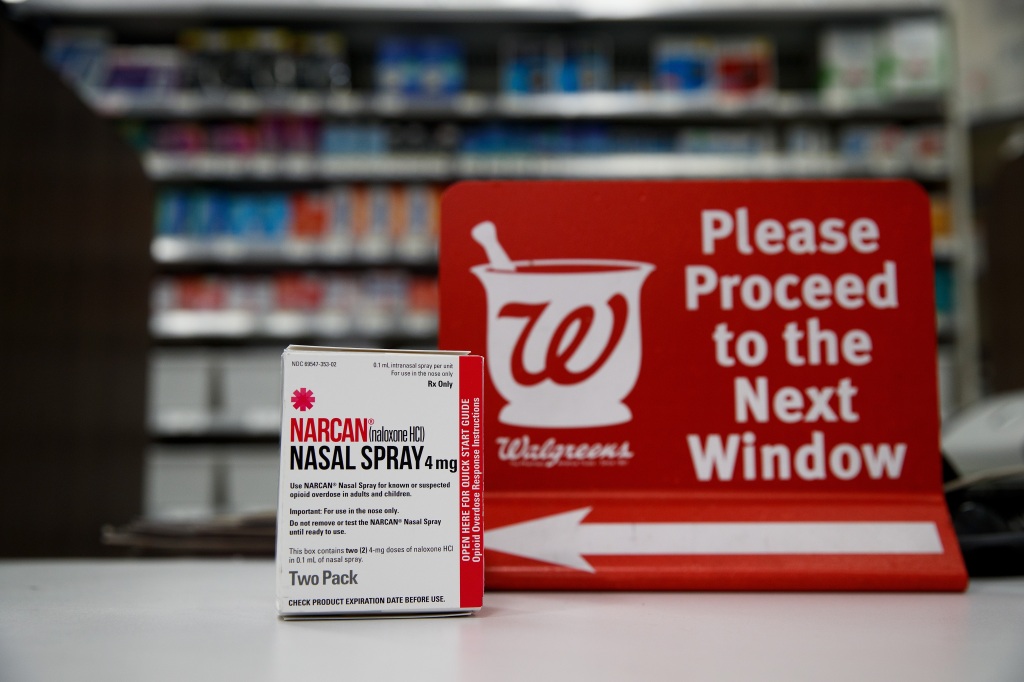
The U.S. Food and Drug Administration authorized the sale of the life-saving opioid treatment Narcan without a prescription on Wednesday, a major step forward in the nation’s fight against the deadly fentanyl crisis that claimed nearly 6,000 lives in California in 2021.
The move by the FDA is expected to significantly expand access to the medication also known as naloxone, which can safely and quickly reverse the effects of a fentanyl overdose. Walgreens, which does not currently sell Narcan over-the-counter in California, immediately announced plans to make the drug readily available online and in stores nationwide as supply becomes available later this year.
But the high price tag of the medication — $70 to $150 without insurance — could still deprive many of the people who need it the most.
“The cost barrier is still very real,” said Rachel Sussman, who practices primary care and addiction medicine at O’Connor Hospital in San Jose. “How many families are going to be able to afford this is a real problem. But I think the fact that it is now possible (to get it over-the-counter) does start to shift the conversation about who should have naloxone available, who can have it, and how easy it is to get.”
The drug, typically packaged as a nasal spray, has become a vital ingredient for schools in combatting the rise in fentanyl-related overdoses among youth. A Bay Area News Group analysis last fall found fentanyl was behind one-fifth of deaths in California youth aged 15 to 24 in 2021. But a survey earlier this month by this news organization of Bay Area high schools found that 27% of responding school districts still did not have Narcan readily available on their campuses. However, that survey showed considerable progress from an earlier survey in December that found that the majority of responding school districts had not acquired doses of the lifesaving drug.
One of the scariest things about fentanyl is that teens who overdose on it often have no idea they are consuming it. It is being laced into less lethal drugs that young people often consume, such as painkillers and stimulants.
Technically, pharmacists in California were already able to sell Narcan without a prescription under state rules. And some major pharmacy chains such as CVS had previously made the medication available without an individual prescription at many locations. But Sussman says that without FDA authorization, many pharmacists had set their own restrictions on how widely they distributed it.
Bay Area families who lost their own children to fentanyl poisoning said that actually getting Narcan over-the-counter has been an ongoing problem.
“I know that even though there is no prescription needed, not every pharmacy has been issuing it in the past,” said Jan Blom, whose 17-year-old son Linus Blom died of opioid poisoning in July 2020 at their home in Los Gatos. Blom said the FDA’s decision to authorize Narcan over-the-counter was a significant development. “I’m not saying that you will be totally fine if you have Narcan, but it’s a wonderful thing to have in this crisis, because we see so many deaths.”
Wednesday’s news comes amid a flurry of bills introduced in Sacramento this legislative session that would expand access to Narcan and take other measures to curb the siege of fentanyl.
- Assembly Bill 24: Would require that gas stations, bars, and even public libraries maintain a stock of naloxone on site.
- Senate Bill 234: Would require all elementary and secondary schools in the state, including charter schools, to maintain a stock of naloxone.
- AB 19: Would require that public schools maintain two doses of naloxone on site.
- SB 10: Would require that schools across the state draft plans for responding to a fentanyl medical event.
- AB 816: Would allow teenagers 16 and up to access the medication buprenorphine as part of narcotic abuse treatment. Buprenorphine is a relatively safe opioid used to help people addicted to opioids fight intense cravings and avoid relapse
Democratic State Sen. Dave Cortese, of San Jose, says that the large number of bill proposals shows the bipartisan consensus in Sacramento that more needs to be done to address the fentanyl crisis. Cortese’s bill requiring that schools draft plans for responding to a fentanyl medical event sailed through its first hearing in the Senate Education Committee last week, receiving unanimous support from all seven members, including two Republicans.
“It’s always good to get off to a good start in the first committee, especially with a unanimous vote — that doesn’t always happen,” Cortese said. “We are not only trying to prevent deaths but respond to them with Narcan.”
Meanwhile, a separate bill championed by Democratic Sen. Tom Umberg and Republican Sen. Rosilicie Ochoa Bogh that would give prosecutors a leg up on charging fentanyl dealers with murder failed its first committee vote Tuesday. The bill would require that convicted fentanyl dealers be told that they could be charged with murder if one of their customers died. The bill was criticized by legal defense organizations, including the California Public Defenders Association, who argued that it was an attempt to revive the failed “war on drugs” policies of previous decades.
For many of the other bills making their way through the legislature, the main barrier to passage is their high cost.
State Assemblyman Patrick Haney, D-San Francisco, is worried that the Golden State’s projected $22.5 billion budget deficit could get in the way of one of his Narcan bills. The bill, which would require that gas stations, bars and libraries get a stock of Narcan onsite, is estimated to cost between $6 to $8 million.
“I recognize this is a tough budget year,” Haney said. But “there are few things that are killing as many Californians as fentanyl, and we have a life-saving intervention that is relatively cheap when compared to (not) saving a life.”
𝗖𝗿𝗲𝗱𝗶𝘁𝘀, 𝗖𝗼𝗽𝘆𝗿𝗶𝗴𝗵𝘁 & 𝗖𝗼𝘂𝗿𝘁𝗲𝘀𝘆: www.mercurynews.com
𝗙𝗼𝗿 𝗮𝗻𝘆 𝗰𝗼𝗺𝗽𝗹𝗮𝗶𝗻𝘁𝘀 𝗿𝗲𝗴𝗮𝗿𝗱𝗶𝗻𝗴 𝗗𝗠𝗖𝗔,
𝗣𝗹𝗲𝗮𝘀𝗲 𝘀𝗲𝗻𝗱 𝘂𝘀 𝗮𝗻 𝗲𝗺𝗮𝗶𝗹 𝗮𝘁 dmca@enspirers.com


